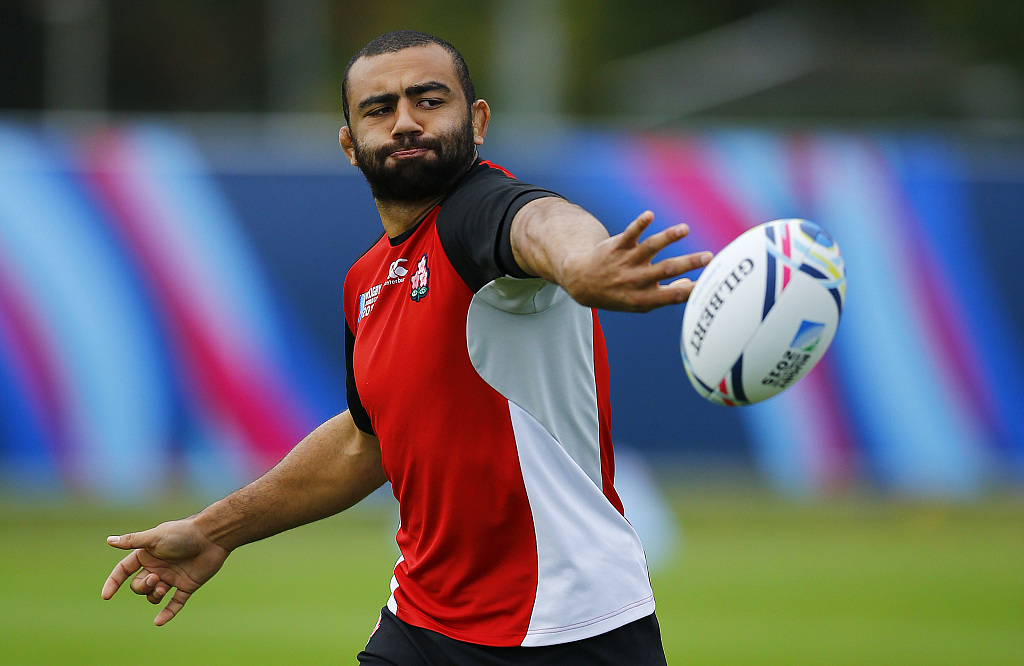
Editor's Note: Ian Buruma is the author, most recently, of "A Tokyo Romance: A Memoir." The article reflects the author's opinions, and not necessarily the views of CGTN.
Siya Kolisi, who raised the Webb Ellis Cup for his country in Yokohama, Japan, early this month, is the first black man to captain the South African national rugby union team, the Springboks, in a game that used to be associated entirely with white South Africans.
He was born in a poor township in the Eastern Cape. Jean de Villiers, a former Springbok captain, said the Springboks' victory was "for the whole country." But it was something in which even non-South Africans could rejoice.
In a way, however, Michael Leitch, the captain of the Japanese team, the Brave Blossoms, is an even more remarkable phenomenon. For several weeks, Leitch, born to a New Zealand father and Fijian mother, became the poster boy of a team representing one of the world's most insular and ethnically homogeneous societies.
Of course, native Japanese stock is hardly pure or monolithic. But, to most Japanese, ethnicity cannot be separated from nationality. Japaneseness runs in the blood.
Leitch, who arrived in Japan for the first time as a 15-year-old schoolboy, seems to prove otherwise. He is now officially known in Japan as Leitch Michael – his names written in the Japanese order.
Leitch is not the only Japanese player from overseas. Other members of the team come from South Africa, Tonga, New Zealand and South Korea. To be sure, there is an element of opportunism in the porousness of national sports teams, and the rules for rugby are especially generous.
Countries like their teams to win, and they will take excellence where they can find it. This concept long predates international sports competitions. After all, most of the soldiers who defeated Napoleon for the Duke of Wellington were born outside the British Isles. Many didn't even speak English.

Michael Leitch, the captain of the Japanese rugby team. /VCG Photo
Michael Leitch, the captain of the Japanese rugby team. /VCG Photo
It is interesting, nonetheless, how quickly tribal feelings can adapt to new circumstances. Not long ago, British soccer clubs, like clubs in many European cities, commanded fierce loyalty along geographic, ethnic and even religious grounds.
Almost all players were local boys. Some teams in London were associated with Irish fans, and others with Jews. In Glasgow, Rangers and Celtic were bitter rivals because one was supposedly Protestant and the other Catholic.
And yet, by the end of the last century, a top British team was lucky to have more than a couple of British players, or indeed a British coach. But fans' loyalty was undiminished, and supporters of different clubs still beat each other up with gusto. The foreign players may be mercenaries, but they are "our mercenaries."
A closer look at tribal loyalties soon reveals a more complicated picture, however, and not just in sports. A Hungarian Jew once told me that Jews are not regarded by anti-Semites as real Hungarians until a Jewish writer wins the Nobel Prize; then they are "one of us."
A German soccer star of Turkish parentage once said that he was a national hero when a game was won, but when Germany lost, he would be the first to be blamed.
Japanese are happy to celebrate the successes of the tennis player Naomi Osaka, who has a Japanese mother and a Haitian father, and was educated in the United States, as national victories, but that doesn't mean that many people regard her as truly Japanese.
One of her sponsors, noodle company Nissin Foods, had to apologize for running an ad campaign featuring the dark-skinned player as a cartoon character with the palest of hues.

Tennis player Naomi Osaka attends a press conference during 2019 WTA Finals Shenzhen in Shenzhen in Guangdong Province, China, October 29, 2019. /VCG Photo
Tennis player Naomi Osaka attends a press conference during 2019 WTA Finals Shenzhen in Shenzhen in Guangdong Province, China, October 29, 2019. /VCG Photo
Leitch has carried a Japanese passport since 2013 and speaks fluent Japanese. Whether most Japanese regard him as "one of us" when he is not on the rugby pitch is open to question.
And yet something is changing, even in hidebound Japan. In the 1950s, a Japanese professional wrestler named Rikidozan became a national idol because he regularly defeated much bigger and usually very blond Caucasian opponents.
There was more than a little showmanship involved in these bouts, which usually began with the pale giant bullying the smaller Asian man and ended with a cathartic victory when the plucky Japanese wrestled the foreigner to the ground.
Humiliated by wartime defeat and U.S. occupation, Japanese men, in particular, enjoyed a sense of vicarious revenge by watching Rikidozan on televisions displayed in shop windows throughout the country.
The fact that the Japanese hero was actually named Kim Sin-rak and was born in the DPRK had to be kept a closely guarded secret. A few people remember how he built a small shrine in his apartment with a photograph of his mother surrounded by various Korean artifacts. But only his most intimate friends knew about this.
In public, he was nothing but Japanese. Unfortunately, when Rikidozan, who ran in dubious circles, was stabbed by a gangster in a Tokyo nightclub in 1963, he went on a bender instead of recovering in hospital and died a few days later.
Leitch's family background obviously is no secret. His looks alone would have made it impossible to hide his foreign origin. But that is precisely the point. Rikidozan had to save Japanese honor by pretending to be something he was not.
There is nothing Japanese in Leitch's bloodlines. Quite a few Japanese might still regard him as an alien. And yet he was made captain of the national team. Call it opportunism. But it is also a sign of progress.
Copyright: Project Syndicate
(If you want to contribute and have specific expertise, please contact us at opinions@cgtn.com)